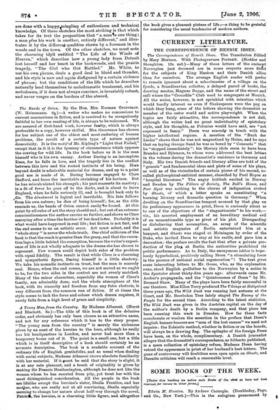The Bands of Orion. By the Hon. Mrs. Norman Grosvenor.
(W. Heinemann. 63.)—A writer who makes no concessions to current mannerisms in fiction, and is resolved to be scrupulously faithful to her own reading of life, is always to be welcomed. We are assured of first-hand work, however faulty, which is always preferable to a copy, however skilful. Mrs. Grosvenor has chosen for her subject one of the oldest and most enduring of human problems, the revolt of a certain type of nature against domesticity. It is the motif of Mr. Kipling's "Light that Failed," except that in it it is the tyranny of circumstance which opposes the craving for wild life. In the book before us it is the man himself who is his own enemy. Arthur Dering is an incomplete Esau, for he falls in love, and the tragedy lies in the conflict between this love and the rooted instincts of his being. Here beyond doubt is admirable material for drama, and up to a point good use is made of it. Dering becomes engaged to Clare Stafford, and faces the inevitable shrinking of his horizon. But he has miscalculated his strength ; his past reasserts its mastery ; in a fit of fever he goes off to the docks, and is about to leave England, when he falls seriously ill, and is brought back only to .die. The denotiment is logical and inevitable. His fate follows from his own nature ; he dies of being himself ; for, as the title reminds us, the bands of Orion cannot easily'be loosed. At this point by all rules of art the story should end ; but out of an extreme conscientiousness the author carries us further, and shows us Clare marrying after a time the brother of her dead leder. Probably it is what would have happened in real life ; but fiction is not fact, and the end seems to us an artistic error. Art must select, and the u whole story " is never the whole truth. Our chief criticism of the book is that the reach is greater than the grasp, and that the execu- tion lags a little behind the conception, because the writer's experi- ence of life is not wholly adequate to the drama she has chosen to represent. Few women could depict both sides of the problem with equal fidelity. The result is that while Clare is a charming and sympathetic figure, Daring himself is a little shadowy. We take his nomadic instincts on trust, but the man is scarcely real. Hence, when the end comes, we are not moved as we ought to be, for the two sides in the contest are not evenly matched. Many of the minor characters, especially the women of Clare's family, are admirably done, and the whole atmosphere of the book, with its sincerity and freedom from any false rhetoric, is very different from the common run of fiction. If at times the style seems to lack the force and colour which drama requires, it rarely falls from a high level of grace and simplicity.






































 Previous page
Previous page